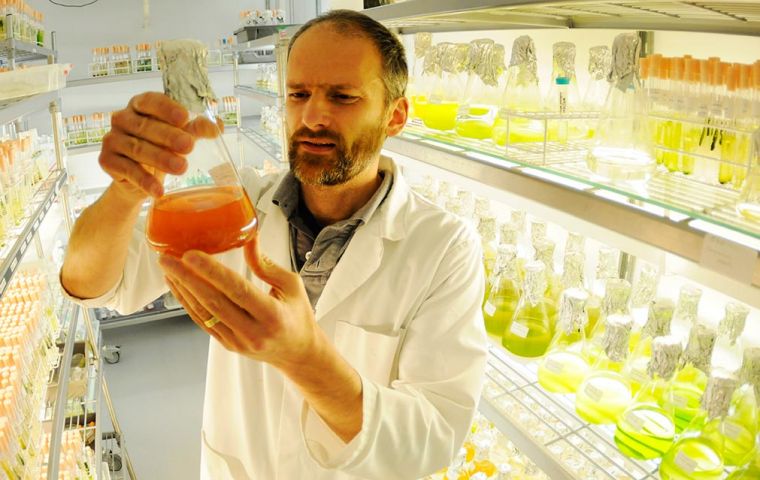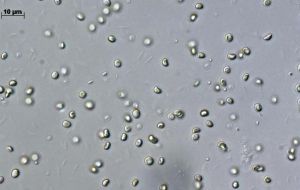MercoPress. South Atlantic News Agency
Scottish lab identifies “super-algae” to make bio-fuels for vehicles and aircraft
 Dr. Stephen Slocombe said that in order to produce bio-fuels from micro-algae “we need to know which strains will produce the most oil.”
Dr. Stephen Slocombe said that in order to produce bio-fuels from micro-algae “we need to know which strains will produce the most oil.”  Micro-algae synthesize high levels of oil, carbohydrates and proteins from sunlight but only a few species are currently grown for health foods
Micro-algae synthesize high levels of oil, carbohydrates and proteins from sunlight but only a few species are currently grown for health foods Researchers at the Scottish Association for Marine Science (SAMS) have unlocked a treasure chest of ‘super-algae’ that could provide a previously untapped source of oil. Using a newly devised technique, scientists examined micro-algae strains in the Culture Collection of Algae and Protozoa (CCAP), an internationally important algal store based at SAMS in Oban, to find out which ocean-based strains had the highest oil content.
The screening revealed two marine strains, Nannochloropis oceanica and Chlorella vulgaris, which had a dry-weight oil content of more than 50%. This makes them ideal sources of bio-fuel for vehicles and aircraft.
The results of the screening, part of the BioMara project, have been published in Nature’s online journal Scientific Reports and are likely to help bring forward research into algae as a source of biodiesel and other bio-fuels by a number of years.
SAMS scientists have demonstrated that Nannochloropsis, for example, is very efficient at converting nutrients, so it has the perfect combination of high levels of oil and high productivity.
The report’s lead author, Dr Stephen Slocombe, SAMS research associate in molecular biology, said: “In order to produce bio-fuels from micro-algae we will have to generate high yields so we need to know which strains will produce the most oil.”
“While there is a lot of work being done on micro-algae biotechnology – currently around 10,000 researchers across the world – no-one has identified a shortlist of the best performing strains and how their properties could be used,” Slocombe added.
Micro-algae synthesize high levels of oil, carbohydrates and proteins from sunlight but only a few species are currently grown commercially for health foods, such as Omega-3 oils and pro-Vitamin A.
In addition to strains for making bio-fuel, the report also signposts those which could be used as sources of food, Omega-3 oils, or aquaculture feed.
This shortlist of ‘super-algae’ will give researchers a head start when investigating which strains to produce, or genetically engineer, for mass culture.
Dr Slocombe added: “This work paves the way for large scale trials of these strains to uncover their true biotechnological utility in the years to come.”
For her part, Dr Michele Stanley, Centre Lead for Marine Biotechnology at SAMS, said: “There has been a great deal of interest in the last few years surrounding bio-fuels from microalgae linked to a very limited number of species. This research generated by the BioMara project not only highlights the potential of marine algae as sources of bio-fuels but also for a wider set of biotechnology applications.” (FIS).-




Top Comments
Disclaimer & comment rules-

-

-

Read all comments“Scottish lab identifies “super-algae” to make bio-fuels for vehicles and aircraft”
Aug 07th, 2015 - 03:47 pm 0surely the english are trying to steal it right now.
piratas
@ 1 POLLY POLLY
Aug 07th, 2015 - 08:13 pm 0You haven't got a clue what this article is on about, have you?
It's a teaser! The lab in question hasn't synthesized any oil from any microalgae, in fact the work needed to do that has not even reached the theoretic phase, that much is clear.
You have to know WHY this nonsense has been released to the press: it's summertime in the UK and all the talking head politicians who feed shit to the papers are on holiday and the poor old 'journalists' aka liars, are at a loss of what to print hence all sorts of nonsense comes out year after year.
Hopefully, in a few decades, some oil may be produced in large scale plants but perhaps not. Who knows, not Slocombe, that's for sure.
Another win for BRITISH science and innovation.
Aug 07th, 2015 - 10:36 pm 0You can be sure that should this ever develop to a viable product/industry, that it will be a BRITISH product/industry.
Dr Stephen Slocombe
2009-present
Postdoctoral Fellow, SAMS
2003-2008
Postdoctoral Fellow, University of York
2000-2003
Postdoctoral Fellow, University of Leeds
1997-2000
Postdoctoral Fellow, Max-Planck Institute, Cologne, Germany
1993-1997
Postdoctoral Fellow, IACR-Long Ashton, Bristol
1989-1993
Postdoctoral Fellow, John Innes Centre, Norwich
1986-1989
PhD, Department of Botany, University of Leicester
1983-1986
BSc (Hons) Biochemistry/Genetics, University of Leeds
And his manager? She got her BSc from the University of Wolverhampton in..... ENGLAND!
Oops Paul, seems the ENGLISH are there. Doing the actual research.
Guess they weren't wasting time singing compulsory anthems while holding a nazi salute during their education.
Commenting for this story is now closed.
If you have a Facebook account, become a fan and comment on our Facebook Page!